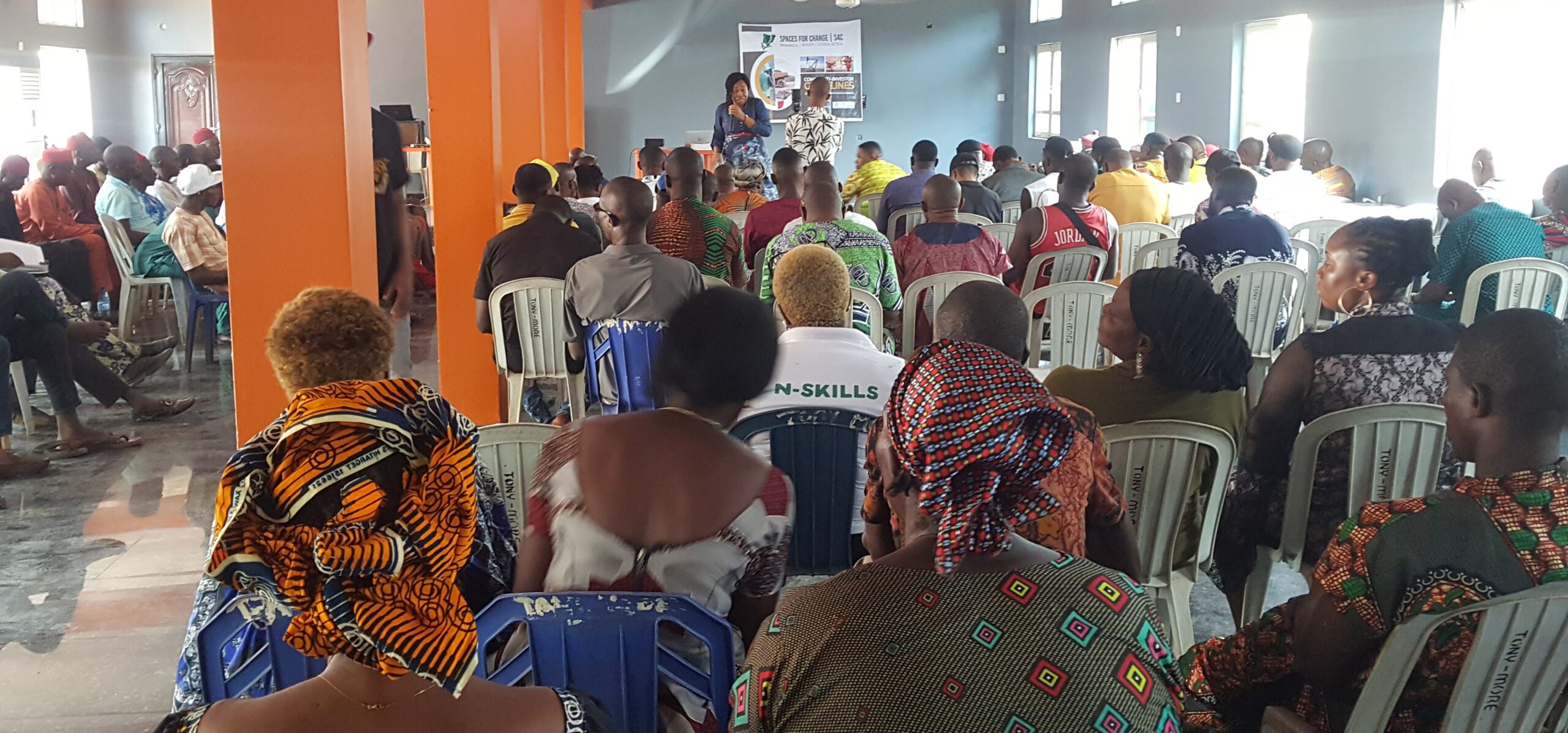
A two-day sensitization meeting organized by Spaces for Change | S4C in Aguleri community Anambra East local government area (LGA) of Anambra State empowered over 160 community members on how to negotiate better deals with investors prospecting oil and gas minerals in their provinces. S4C’s “Community-Investor-Guidelines” (CIG) has been developed to build the capacity of resource-rich communities to engage investors meaningfully throughout the lifecycle of an extractive project: from discovery and exploration, to planning, construction, operations, and closure.
Anambra State was recently designated an oil-producing state in Nigeria following the recent discovery of the Aguleri-Otu oil well in Anambra East LGA, Anambra State. Since 2012, oil installations and assets belonging to an indigenous oil company—Orient Petroleum Resources Plc (OPR)—are already on the ground, operating under the license number: OPL 915. The license covers Anambra River Oil Wells – Anambra River 1, 2, and 3 situated in Aguleri, and extending to Enugu-Otu, Mkpunando, and Eziagulu. Before this discovery, Aguleri’s famed fertile farmlands earned it special recognition as the food basket of Anambra State. Today, ongoing exploration activities have allegedly impacted agricultural productivity.
Against this backdrop of surging discontent arising from declining agricultural outputs, over 160 participants, comprising traditional rulers from the three host communities, representatives of Anambra State Ministry of Petroleum and Mineral Resources, local government chairpersons, president generals of town unions, women leaders, youth leaders, and children, converged at Aguleri townhall to explore potential solutions to their collective concerns. Top on the list of their concerns is the strained relationship between communities and the investor since the commencement of exploration activities, the lack of meaningful community engagement, and the alleged failure to honor agreements espoused in the Memorandum of Understanding (MOU) executed between communities and OPR.
The Community-Investor Guidelines contain answers to these types of challenges arising between communities and investors. Armed with the CIG, S4C’s team of facilitators sensitized Aguleri community members on the rights of extractive communities, the duties of investors, the pre-investment modalities, benefit-sharing arrangements espoused by law, potential environmental concerns, grievance mechanisms and legal remedies available to them. In particular, they learned about the rights of extractive communities and the obligations of investors to host communities. One such obligation is the requirement for settlors to establish the Host Community Development Trust (HCDT) in their areas of operation. Setting up the Trust is not an act of benevolence, but a statutory right enshrined in Chapter 3 of the Petroleum Industry Act (PIA) 2021.
S4C learned that investors have yet to establish the HCDT in Aguleri. Accordingly, the community learned about the PIA provisions regarding the structure, composition and administration of the Trust. Due process requirements and safeguards outlined in the PIA include meaningful consultation, public meetings, representation in the governance structures for the development of their community, receiving 3% of the investor’s operating expenditure in the preceding year, access to grievance mechanisms, and the establishment of participatory mechanisms that enable the community to voice their concerns, priorities, and aspirations. Community members can hold investors accountable only when they have a strong understanding of their rights and responsibilities.
With this new understanding, community members, together with the local authorities, resolved to take necessary action towards asserting their rights. The warm reception S4C received in Aguleri community powerfully reflects the collective thirst for knowledge and legal empowerment across the different communities. The program ended with a shared commitment by community leaders of the various host communities to work together with S4C to foster sustainable development and prosperity of local people using the benefits derived from natural resources.



